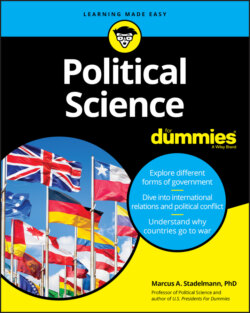Читать книгу Political Science For Dummies - Marcus A. Stadelmann - Страница 19
Views on who holds the power
ОглавлениеOne of the ongoing questions in political science is how can the researcher determine who holds power in a society. Over time, six different explanations were developed.
Bureaucratic theory: Bureaucratic theory assumes that bureaucracies in countries hold power and make the most important decisions for society. It’s therefore not politicians nor other leaders but top-level bureaucrats who run a country. They work for the good of the country, not to amass wealth, and their policies are based on what’s best for a country. When studying France or Japan, two countries with powerful bureaucracies, bureaucratic theory can be used to study political power.
Pluralism: Pluralism, as developed by James Madison (see Figure 1-2) in Federalist Paper Number 10, believes interest groups will be created as societies become more economically and socially complex. People will join together to push for their own interests and for government benefits. These interests can be economic, professional, ideological, environmental, or even religious. All these diverse groups will now compete for public benefits, ensuring that public policy will benefit not only a few people but a majority in the country. Political power is therefore held by interest groups, representing the people. As soon as one group of citizens feel disadvantaged, they’ll begin to organize and compete for benefits. Suddenly, many interest groups are competing for political benefits and hopefully balancing each other out overall. Pluralism assumes that everybody will get a little bit from policymakers, but nobody will get everything he asks for. This balance makes every interest group accept lawmakers’ policy decisions without complaining or, more importantly, without taking action against policymakers.Source: James Madison/Alamystock PhotoFIGURE 1-2: James Madison is the developer of pluralism.
Corporatism: Corporatism also deals with interest groups. However, there are not tens of thousands as in the U.S., but a lot less. There may be only three. These groups are large and powerful and directly deal with the government when it comes to policy making. Therefore, a few but very powerful interest groups hold power in a society. The political scientist needs to study these to find out who holds power in a society. Examples of corporatist countries include Germany, Austria, and most of Scandinavia.
Elite theory: Elite theory, as created by the great Italian social scientists Vilfredo Pareto and Gaetano Mosca, states that every society has an elite that holds political power. That elite differs from society to society. In some societies, it’s blood based, meaning you have to be born into it. A monarch with a ruling aristocracy comes to mind. In other places, wealth puts you into the elite. The more money you have, the more influential you’ll be. This is often the case in capitalist countries like the U.S. or Great Britain. Another determinant of power is religion; Iran is governed by a religious elite. Membership in organizations such as an elite political party, for example, the Communist Party of the Soviet Union, or the military can put someone in the elite. A military dictatorship such as found in Chile from 1973 until 1990 under General Pinochet is an example. In a nutshell, elite theory states that in every society an elite holds political power.
Marxism: A Marxist believes that whoever holds economic power also holds political power. In other words, control of the economy equals control of government. In a capitalist society, the economy is controlled by the upper and middle classes, and therefore they control government. In a feudal society, the king and his aristocracy control the economy and therefore government (for a detailed discussion of Marxism, see Chapter 17).
